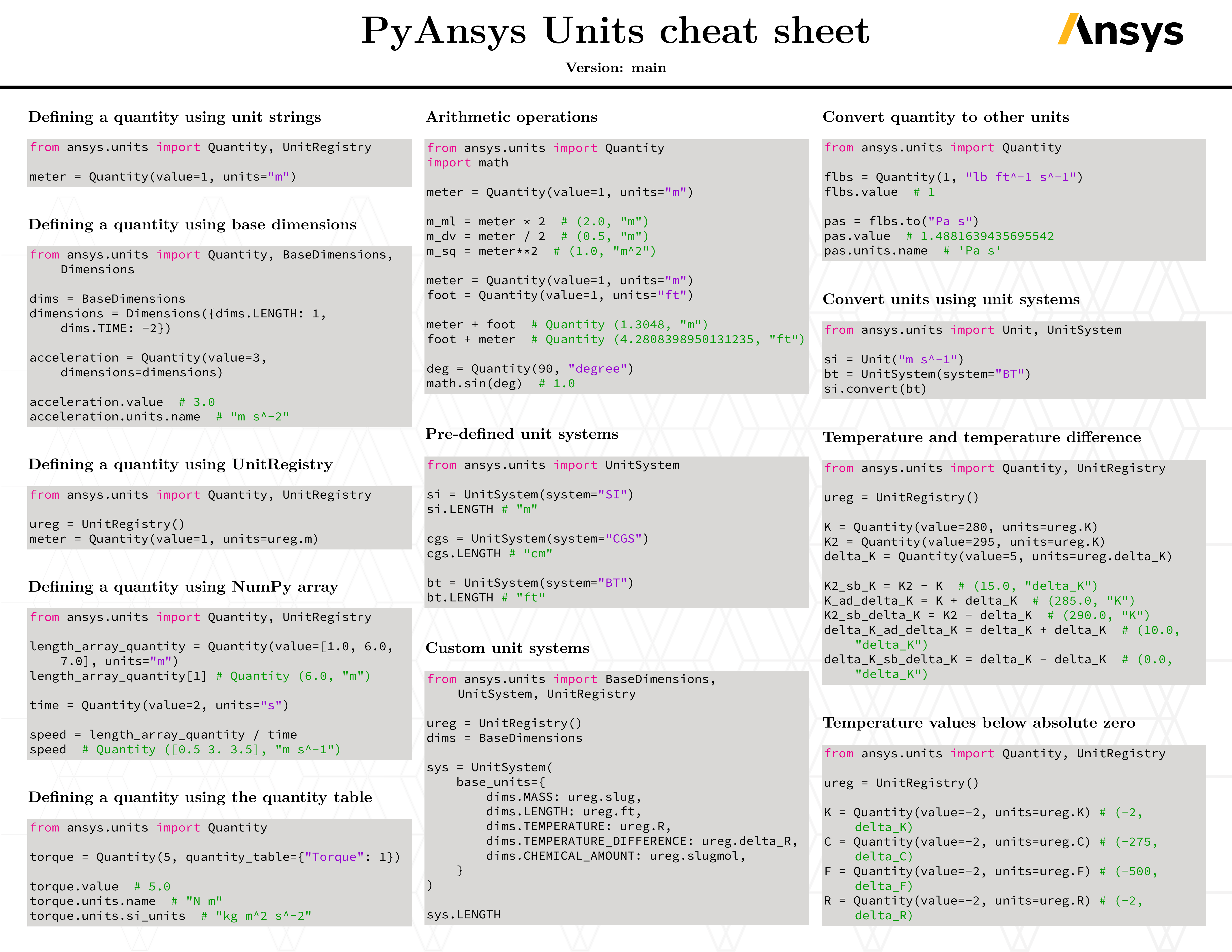Getting started#
PyAnsys Units provides a Pythonic interface for units, unit systems, and unit conversions. Once imported the package is initialized with units and unit systems for you to use, and is fully customizable if something you need is not present.
Basic usage#
PyAnsys Units supports defining quantities and their units in a intuitive way.
Start by importing the ansys.units package:
from ansys.units import Quantity, UnitRegistry, BaseDimensions, Dimensions
You can instantiate quantities with one of four methods:
# Using supported unit strings
volume = Quantity(value=1, units="m^3")
volume.value # 1.0
volume.units.name # "m^3"
# Using Unit instances
ureg = UnitRegistry()
mass = Quantity(value=1, units=ureg.kg)
volume.value # 1.0
volume.units.name # "kg"
# Using base dimensions
dims = BaseDimensions
dimensions = Dimensions({dims.LENGTH: 1, dims.TIME: -2})
acceleration = Quantity(value=3, dimensions=dimensions)
acceleration.value # 3.0
acceleration.units.name # "m s^-2"
# Using the quantity table
torque = Quantity(5, quantity_table={"Torque": 1})
torque.value # 5.0
torque.units.name # "N m"
torque.units.si_units # "kg m^2 s^-2"
You can instantiate unit systems with one of two methods:
# Use a pre-defined unit system
si = UnitSystem(system="SI")
si.base_units # ['kg', 'm', 's', 'K', 'delta_K', 'radian', 'mol', 'cd', 'A', 'sr']
# Custom unit systems are defined by passing selected base units. Any unit
# type that is not given defaults to SI.
dims = BaseDimensions
sys = UnitSystem(
base_units={
dims.MASS: ureg.slug,
dims.LENGTH: ureg.ft,
dims.TEMPERATURE: ureg.R,
dims.TEMPERATURE_DIFFERENCE: ureg.delta_R,
dims.CHEMICAL_AMOUNT: ureg.slugmol,
}
)
sys.base_units # ['slug', 'ft', 's', 'R', 'delta_R', 'radian', 'slugmol', 'cd', 'A', 'sr']
Examples#
Perform arithmetic operations:
from ansys.units import Quantity
deg = Quantity(90, "degree")
math.sin(deg) # 1.0
v1 = Quantity(10.0, "m s^-1")
v2 = Quantity(5.0, "m s^-1")
v3 = v1 - v2
v3.value # 5.0
vpow = v1**2
vpow.value # 100.0
vpow.units # "m^2 s^-2"
Directly convert values to another set of units:
from ansys.units import Quantity
flbs = Quantity(1, "lb ft^-1 s^-1")
flbs.value # 1
pas = flbs.to("Pa s")
pas.value # 1.4881639435695542
pas.units.name # 'Pa s'
Use a custom unit system to perform conversions:
from ansys.units import Quantity, BaseDimensions, UnitSystem
dims = BaseDimensions
sys = UnitSystem(
base_units={
dims.MASS: ureg.slug,
dims.LENGTH: ureg.ft,
dims.TEMPERATURE: ureg.R,
dims.TEMPERATURE_DIFFERENCE: ureg.delta_R,
dims.CHEMICAL_AMOUNT: ureg.slugmol,
}
)
v = Quantity(10, "kg m s^2")
v2 = v.convert(sys)
v2.value # 2.2480894309971045
v2.units.name # 'slug ft s^2'


